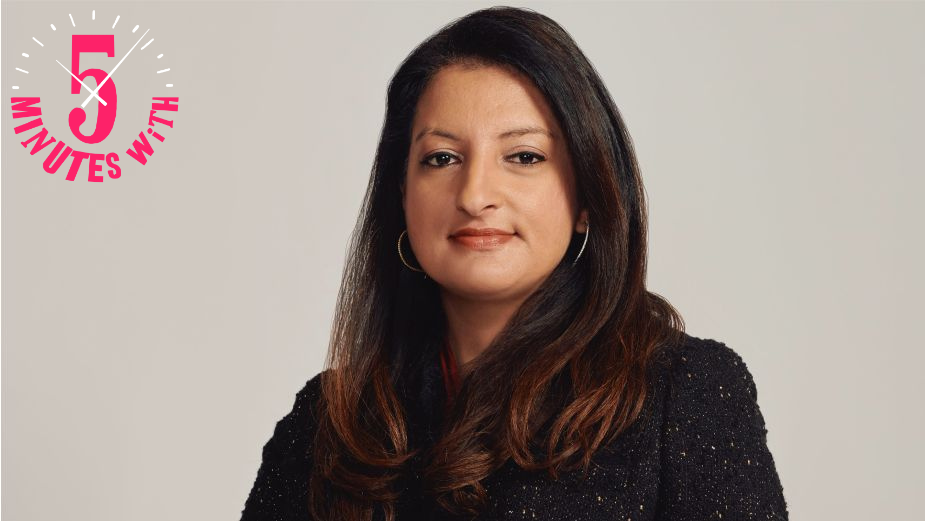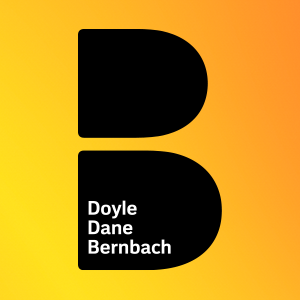
5 Minutes with… Nikki Lamba

Nikki Lamba is DDB first ever global chief diversity, equity and inclusion officer, a role that she took at the end of 2020 when DDB was undergoing huge transformation globally and across North America.
In her role, Nikki is responsible for designing and implementing DDB’s global DEI strategy and ensuring that DDB’s core values, The Four Freedoms (which were updated just last week), are a key driver for agency culture. As part of that revamp, Nikki and the team also established five key behaviours intended to bring the Four Freedoms to life, “allowing us to create greater accountability”. The five behaviours are: empathy, trust, inclusion, humility and drive.
Prior to her current role, Nikki spent 11 years with global research organisation Catalyst, providing partnership and guidance on organisational strategies and D&I programming in order to hire, advance and retain diverse talent for F1000 organisations across a range of industries.
LBB’s Addison Capper caught up with Nikki to discuss the intricacies of driving and managing DEI across a business with offices in 90 countries, the opportunity in defining a new role, and how a global upbringing shapes her life both in and out of work.
LBB> You were raised between the US and India and educated in India, the US and the UK. Can you tell us a bit about your childhood and the path that led you to work in and have a passion for DEI?
Nikki> I feel fortunate to have had a global upbringing and be raised by not only my parents, but my grandparents and extended family too. Living in different countries at a young age fast tracked my understanding and perspective to be able to navigate different environments, cultural norms and have a general understanding of the uniqueness of cultures and customs. I also was quick to figure out that I belonged to both the ‘in group’ and ‘out group’ depending on where I was geographically situated.
While diversity, equity, and inclusion wasn’t a formal career track when I was completing my secondary education, it was always a part of my upbringing and how I viewed the world around me. When I started working at Catalyst, DEI was in its nascency, and I became immersed in research and best practices as the subject became mainstream in corporations. The opportunity to work with companies and shape the experience of people on a broad scale was challenging and rewarding. I’m also married to someone that comes from a different culture than me and together we’re raising children with multi-cultural identities. DEI isn’t just about work for me, it’s my day-to-day life.
LBB> You were appointed as DDB's first ever chief diversity, equity and inclusion officer at the end of 2020. How did that opportunity come about and what were your main ambitions and aims with it?
Nikki> Let me start by acknowledging how privileged I feel to hold this important role at DDB, and to be the first person tasked with it. It started with conversations with key leaders at DDB, including our global CEO Marty O’Halloran and North America CEO Justin Thomas-Copeland. My ambition was to bring my experience in consulting, leading companies on their DEI strategies and initiatives, to laying the groundwork at DDB. My vision included a holistic approach in developing a strategy that transformed how DEI shaped the business and people experience. In order to do this, I knew that I needed the partnership of leadership across DDB as the tone is always set from the top. And coming out of all the conversations, I was excited and energised by the commitment and energy around driving change as a business imperative.
LBB> The role of DEI officer is not only new to DDB - it is new to many businesses that are employing in that area. How does this impact the way that you approach your job, if at all? Does it create more opportunity or is the lack of foundation somewhat of a hindrance? A bit of both?
Nikki> There’s a massive opportunity, generally, to define the role and function and to establish it as a core business function. I’m optimistic about the role but recognise that’s influenced by the commitment and support I see across DDB and Omnicom. It’s also important to recognise that having a foundation isn’t always the best way to start a job, especially if you feel it has cracks. This role is also unique in that our world, both at macro and micro levels, is changing minute by minute. This has certainly been apparent in the past couple of years with the pandemic and the massive humanitarian and economic impact it’s had globally. So, the role of a DEI officer is also one that needs to evolve and be in tune with society and culture. We have a responsibility to represent the world in which we, and our clients, live and work. DDB is recognised worldwide for its creativity and how we bring that to life through Unexpected Works which gives us an important platform to break stereotypes, ensure the people and experiences we capture depict the lived realities of those we are trying to reach.
LBB> I feel like the role has so many different elements and requires a varied expertise, such as data analysis, leadership, talent management (HR), etc. Can you speak a bit about how you see the role and what it entails?
Nikki> You’re absolutely right. When I look around at my peers who are DEI leaders, they come from very diverse backgrounds (e.g. finance, sociology, PR/communications, HR) which is a wonderful thing because they bring really unique perspectives and insights to the work. Success in this role requires both qualitative and quantitative savvy, and a high degree of empathy and emotional intelligence. A DEI officer is in the boardroom one day and a safe space for an employee on another day. We help amplify the voices and needs of employees, especially those from non-dominant groups.
LBB> Tell me about the work that you have done at DDB so far. What was the situation when you joined and what have you implemented since?
Nikki> DDB was undergoing a rapid transformation when I joined last year, under new leadership both globally and in North America. In North America, we restructured HR as a regional team focused on talent attraction and acquisition, and talent retention and growth. This pivot levelled up our ability to deliver a people-first strategy and allowed me the opportunity to ensure DEI was built into all of our HR systems and processes. In my first three months, I spent a significant amount of time understanding the needs of our workforce and leaders which helped inform the strategy which I subsequently created. The strategy is a holistic approach framed by five pillars that are aligned to our business priorities.
I also led a global team that worked on the rearticulation and relaunch of DDB’s core values, the Four Freedoms: The Freedom to Be, The Freedom from Fear, The Freedom to Fail and the Freedom from Chaos. The new articulation is modern, reflects the future of work and is something that can be embraced by all employees, regardless of level and location. We also established five key behaviours which are intended to bring the Four Freedoms to life, allowing us to create greater accountability. These five behaviours are: empathy, trust, inclusion, humility and drive.
LBB> You are part of DDB's North America leadership team and you lead its Equality in Advertising Council. Can you speak about these parts of your role?
Nikki> As a member of the NA leadership team, I am giving voice to DEI strategy, implementation and topics at every juncture alongside all the agency leaders and functional leaders. At a leadership level, we are tracking key quantitative KPIs quarterly alongside qualitative measures which help us understand how DEI is showing up in the office and in our creative work. In North America, I lead our regional DEI Council, called the Equality in Advertising Council (EAC). This council brings together representatives from all our North America offices and convenes bi-weekly to develop and execute learning moments and trainings that are aligned with our global DEI strategy. In the past year, we’ve held a number of programs and trainings focused on educating our employees on a range of DEI topics, providing them with the language, cultural and historical contexts for better understanding the causes of systemic inequity in our industry and society at large.
LBB> Can you share more about the results of some of these DEI initiatives and practices at DDB?
Nikki> In the past year, we’ve recruited our most diverse cohort of employees in North America based on self-identified race, gender and ethnicity. The North America leadership team alone is an incredibly diverse mix of people, each leader bringing a unique background and perspective that sets the tone from the top. This is a reflection to all our people who make DDB’s culture what it is, and an exciting place to learn, connect and grow professionally and creatively. In terms of measurement, DDB uses a global engagement survey to track employee sentiment which includes questions on inclusion. In the past year, I’m happy to say that we’ve seen a positive change in these results, and we’ll continue to listen, learn so we’re continually evolving and improving the employee experience, making DDB a welcoming and inclusive place for all.
LBB> What traits and skills make for a strong DEI officer?
Nikki> Resilience, tenacity, influencer, empathy, humility.
LBB> How much of a DEI officer’s success lies with the willingness to execute change of the organisation that they work for?
Nikki> Organisations need to be progressive and forward thinking if they’re to stay relevant, that applies to any aspect of the business including DEI. This requires a constant evolution, although my view is that one person alone cannot singlehandedly drive any change. Sustainable change requires a partnership, coalition and shared accountability. Successful leaders inspire hope and empower others to become change agents.
LBB> Your job role is global – how important is it to be aware of and respectful of different local cultures and how that may influence their approach to DEI? And how do you manage this?
Nikki> Critically important because DEI is about levelling the playing field so all talent can thrive, succeed and feel seen and heard. DDB has 10,000 people across 90 countries – and while there are commonalities that unite us, there are countless local nuances that influence how people see the world around them, and their place in it. Local cultures, customs, legislation are just a few of the considerations. The way we’ve been able to scale our DEI efforts is through partnership with local leaders and creating a global framework with shared pillars and ambitions but the flexibility for regional leadership to determine the local implementation and action plans.
LBB> What are your plans and aims for the rest of 2022?
Nikki> I’m energised by the progress we’ve made but recognise that DEI is very much a long game. My plan is to continue to partner with my colleagues across the network to make DEI everyone’s business by helping them understand the role they play in driving change and empowering them and connecting them to resources to help them succeed.













